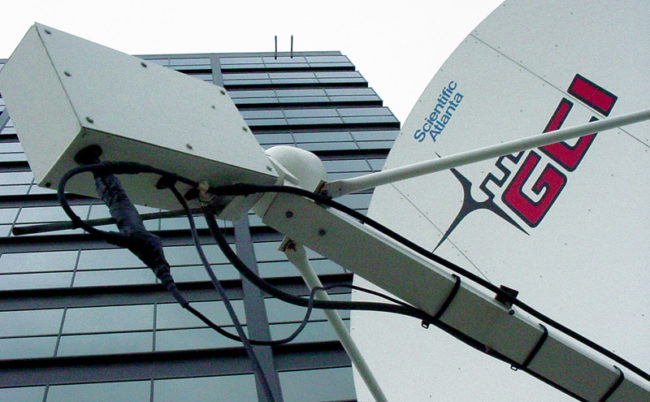
It may be months before the Federal Communications Commission rules on GCI’s application to take over two small television stations in Southeast Alaska and one in Anchorage. Commercial broadcasters have lined up to oppose the purchase and request a hearing before the commission, something the FCC is often reluctant to do.
As Rosemarie Alexander reports, the question hinges on whether the merger is in the public’s interest.
Juneau resident Walter Gregg is old enough to remember when television in Alaska was all tape delayed.
“We didn’t watch the moon landing live, we watched it later and not very high quality,” he recalls.
Gregg lives in downtown Juneau and is a regular viewer of five major network stations over the air, including low power NBC affiliate KATH and CBS station KXLJ, which carries some programming from the Anchorage CBS affiliate, KTVA.
In November, GCI announced that its subsidiary, Denali Media Holdings, would buy KATH and sister station KSCT in Sitka as well as KTVA.
The stations are picked up in parts of their respective communities by television antenna for free. Now Gregg wonders if he’ll eventually have to pay to watch NBC & CBS on GCI cable, as do viewers in much of outlying Juneau where cable and satellite providers are the only way to get TV.
“I had a gut reaction against what they were doing just from the standpoint of oh my gosh, the cable’s going to own the broadcast stations, too,” he says.
Gregg has written letters to the FCC protesting GCI’s purchase of KATH and KTVA.
Juneau Senator Dennis Egan says he also will weigh in on GCI’s application. He’s been hearing from constituents about it and shares their concerns.
“You know, it worries me that you’re going to have to subscribe to cable to get over the air television,” Egan says.
Until GCI publicly announces details of its expansion, the concerns are speculation. The company has not stated its intention for the stations, except to become “a news and entertainment leader unparalleled in Alaska.” That worries Alaska’s commercial television licensees, who will compete over the air and on cable.
GCI claims it is capable of serving 80 percent of Alaska households with voice, video and broadband. It already has 70 percent share of the consumer broadband market. The company’s 2012 year-end financial statement, just released, indicates revenues of $710.2 million, a 4.5 percent increase over 2011.
“GCI is really a monopoly in cable TV and broadband in this state and very strong in wireless,” says Andrew MacLeod, president and general manager of KTUU in Anchorage, an NBC affiliate.
KTUU and four other licensees of television stations in Ketchikan, Sitka, Juneau, Anchorage and Fairbanks recently submitted a Petition to Deny to the FCC; Anchorage station KYES has filed a separate petition.
MacLeod says the broadcasters welcome competition, but doubts a distribution company as large as GCI could compete fairly:
“When you mix distribution and content, we want to make sure there’s a level playing field because distributors can squeeze out content providers like us, who provide news and entertainment, via their strength and distribution,” he says.
GCI is leasing space in the Anchorage Daily News building for a news department. The company has hired former KTUU news director John Tracy to help create a news division. Tracy is now co-owner of advertising agency Bradley Reid and Associates.
GCI spokesman David Morris says the company’s entry into the broadcast market will increase competition:
“It’s our goal to create a premiere news and information company,” Morris says. “We plan to roll out high definition and we think that’s what consumers want. And to the extent that stimulates other broadcasters to become more competitive, we think that’s a good thing.”
The broadcasters’ Petition to Deny compares GCI’s application to Comcast’s 2011 acquisition of NBC Universal. Comcast was already one of the nation’s largest communications companies, and the FCC required a number of conditions limiting competition between cable and broadcast television.
KTUU’s MacLeod calls the conditions “safety guides, so that a strong distribution company like Comcast couldn’t operate a content company and disadvantage all the other content companies.”
Angela Campbell is a communications attorney and professor at Georgetown University Law School in Washington, D.C. Over the years, she has filed numerous challenges to applications before the Federal Communications Commission.
Campbell believes the Comcast / NBC case does provide precedent, but in all cases before the FCC,“the question really is, is this in the public interest?” That is, would it benefit the markets served by the TV stations?
While broadcasters argue GCI’s television station takeover would put too much power in the hands of one company, GCI’s qualification to assume the licenses is not being challenged. And the FCC has thrown out a rule that once prohibited ownership of a cable and television station in the same market.
“This is a much harder case for the challengers to win, because they (commissioners) don’t have a specific rule to help them,” she says.
Campbell says concern the stations would no longer operate over the air but only on cable might be real, considering the FCC’s push to free up space on the broadcast airwaves.
“They’re basically trying to get television broadcasters to be willing to give up their spectrum in exchange for money and give their spectrum back to the FCC, then the FCC is going to auction that to wireless,” she says.
However, the value of spectrum in the tiny television market of Juneau would probably be low.
Campbell says the current FCC looks more favorably on the cable industry than have past commissions and is very interested in expanding broadband, which GCI has been steadily doing throughout the state.
